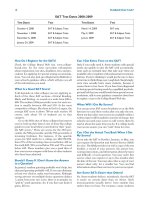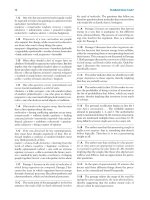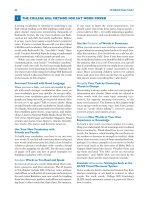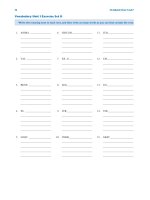Sat - MC Grawhill part 18 ppt
Bạn đang xem bản rút gọn của tài liệu. Xem và tải ngay bản đầy đủ của tài liệu tại đây (180.6 KB, 10 trang )
160 MCGRAW-HILL’S SAT
Vocabulary Lesson 48: Go Forth
Today’s roots: supare scatter satur full
vergere, vert to turn undare to flow
❑ disseminate (v) to spread information (dis- away + seminare to sow)
The members of the band disseminated flyers that advertised their debut concert this coming weekend.
Synonyms: circulate, publicize, distribute Antonym: suppress
❑ diverge (v) to go apart (dis- away + vergere to turn)
After traveling together for nearly 100 miles, the two cars finally diverged.
Synonyms: divide, branch Antonyms: converge, merge
❑ proliferate (v) to grow rapidly; to produce offspring at a rapid pace (proles offspring)
The bacteria proliferated at an alarming rate, multiplying tenfold in just 30 minutes.
Synonyms: expand, multiply Antonyms: wither, shrink
❑ amass (v) to accumulate; to gather together
Over the years, Rick has amassed quite a collection of CDs, accumulating over 1,000 of them.
Synonyms: collect, gather, hoard Antonyms: distribute, disperse
❑ distend (v) to swell; to increase in size (dis- apart + tendere to stretch)
Malnutrition can cause the abdominal cavity to distend and produce a bloated look.
Synonyms: expand, dilate Antonym: constrict
❑ propagate (v) to cause to multiply; to publicize; to travel through a medium ( pro- forth)
Plants of all sizes and shapes propagate by forming seeds, which develop into new seedlings.
Synonyms: procreate, breed
❑ inundate (v) to flood (in- into + undare to flow)
After days without work, the lawyer was astonished to suddenly find himself inundated with paperwork.
Synonyms: engulf, overwhelm, swamp, deluge
❑ diffuse (v) to spread out, as a gas (dis- apart + fundere to pour)
Synonyms: circulate, disseminate
❑ germinate (v) to sprout; to grow (germen sprout)
Synonyms: bud, burgeon, develop
❑ disperse (v) to spread apart (dis- apart + spargere to scatter)
Synonyms: diffuse, disseminate
❑ rampant (adj) growing out of control (ramper to climb)
Synonyms: rife, predominant, prevalent
❑ dissipate (v) to scatter (dis- apart + supare to scatter)
Synonyms: dispel, disperse
❑ saturate (v) to fill completely, as with a liquid or solute (satur full)
Synonyms: soak, imbue
CHAPTER 3 / BUILDING AN IMPRESSIVE VOCABULARY 161
Vocabulary Lesson 49: Even More
Today’s roots: ad- to scribere to write
post- after augere to increase
❑ annex (v) to attach; to acquire land to expand an existing country (ad- to + nectare to attach)
When Hitler annexed Poland, the dictator’s imperialist designs should have been clear.
Synonyms: acquire, appropriate, append Antonyms: disengage, dissociate
❑ addendum (n) something added; a supplement to a book (ad- onto)
After he completed the story, the author wrote an addendum explaining why he finished it the way he did.
Synonyms: appendix, supplement
❑ postscript (n) a message added after the completion of a letter (P.S.) (post- after + scriber to write)
After my wife signed the postcard, she remembered something else she wanted to say and wrote a postscript.
❑ epilogue (n) an extra chapter added onto the end of a novel (epi- Gr in addition + logia words)
In the epilogue, the author described what the characters of the novel did 15 years after the main narrative.
Synonyms: afterword, postlude Antonyms: prelude, forward, preface, prologue
❑ append (v) to affix something; to add on (ad- to + pendere to hang)
The publishers appended an index to the end of the text to help the reader find things more easily.
Synonym: annex
❑ adjunct (adj) added in a subordinate capacity (ad- to + jungere to attach)
Although principally a biologist, Dr. Carter was also an adjunct professor in the zoology department.
Synonyms: subordinate, subsidiary
❑ augment (v) to add onto; to make greater (augere to increase)
One important way to augment your SAT score is to study vocabulary.
Synonyms: enlarge, enhance, amplify, boost, strengthen Antonym: diminish
❑ cession (n) the act of surrendering or yielding (cessare to yield)
Synonyms: capitulation, relinquishment
❑ affix (v) to attach (ad- to + figere to fasten)
Synonyms: annex, append
❑ appropriate (v) to take another’s work or possessions as one’s own (ad- to + proprius one’s own)
❑ encore (n) an extra performance at the end of a show (encore Fr again)
Synonym: curtain call
❑ appendix (n) supplementary material at the end of a text (ad- to + pendere to hang)
Synonym: addendum
❑ supplement (v) to add something to complete or strengthen a whole (supplere to complete)
❑ circumscribed (adj) having distinct boundaries or limits (circum- around ϩ scribere- to write)
162 MCGRAW-HILL’S SAT
Vocabulary Unit 7 Exercise Set I
Time—8 minutes
For each question, select the best answer among the choices given. Note any vocabulary words to
review on the Hit List below.
1. While most people would probably be in
her position, Stacey somehow managed to
remain upbeat and was convinced that things
would get better.
(A) elated
(B) diminutive
(C) defamed
(D) anemic
(E) despondent
2. Seemingly without scruples, the professor
the work of his graduate students and published
papers on topics he himself had not even
researched.
(A) isolated
(B) relegated
(C) appropriated
(D) annexed
(E) eulogized
3. It is shocking that someone who was once so
by the public can so quickly become
after just one social blunder.
(A) belittled . . a malady
(B) disparaged . . a pariah
(C) saturated . . an exile
(D) lionized . . an outcast
(E) ostracized . . a recluse
4. The dearth of land in this region of the
country makes it very difficult to maintain
plentiful harvests.
(A) desiccated
(B) arable
(C) fallow
(D) celestial
(E) arid
5. The entrance of the cavern was so that the
indigenous tribes took advantage of its
shelter to keep entire clans dry during the heavy
rain season.
(A) voluminous . . capacious
(B) enormous . . scanty
(C) cavernous . . meager
(D) fecund . . spacious
(E) astral . . copious
6. Although many consider “Deadman’s Run” to
be the most ski trail on the mountain,
Tommy was able to maneuver through the
course without after having just learned to
ski.
(A) simple . . trouble
(B) difficult . . speed
(C) arduous . . exertion
(D) pedestrian . . concern
(E) pragmatic . . practical
7. Zach’s knowledge of helped him to identify
and avoid the rare and poisonous African spit-
ting beetle.
(A) entomology
(B) etymology
(C) ethics
(D) pathology
(E) sociology
8. The spy was immediately back to his coun-
try after he was caught attempting to pilfer
information from the CIA database.
(A) quarantined
(B) secluded
(C) disseminated
(D) distended
(E) deported
9. It is hard to imagine that this barren desert with
little to no plant life was once with farms
and wildlife.
(A) doleful
(B) replete
(C) germinated
(D) rarefied
(E) afflicted
10. After finishing a good novel, I’m always eager to
see if an follows to tell me what happened
to the main characters after the conclusion of
the narrative.
(A) elegy
(B) epitaph
(C) epilogue
(D) encore
(E) eulogy
HIT LIST
CHAPTER 3 / BUILDING AN IMPRESSIVE VOCABULARY 163
Vocabulary Unit 7 Exercise Set II
Write the meaning next to each root, and then write as many words as you can that contain the root.
1. EPI-______________________
__________________________
__________________________
__________________________
__________________________
2. AD-_______________________
__________________________
__________________________
__________________________
__________________________
3. SCRIBERE_______________
__________________________
__________________________
__________________________
__________________________
4. COPIA____________________
__________________________
__________________________
__________________________
__________________________
5. LUNA____________________
__________________________
__________________________
__________________________
__________________________
6. ASTRUM_________________
__________________________
__________________________
__________________________
__________________________
7. PLERE___________________
__________________________
__________________________
__________________________
__________________________
8. SOLUS___________________
__________________________
__________________________
__________________________
__________________________
9. GENEA___________________
__________________________
__________________________
__________________________
__________________________
10. POST-____________________
__________________________
__________________________
__________________________
__________________________
11. ARKHAIOS_______________
__________________________
__________________________
__________________________
__________________________
12. DEMOS__________________
__________________________
__________________________
__________________________
__________________________
13. VERT____________________
__________________________
__________________________
__________________________
__________________________
14. LOGOS___________________
__________________________
__________________________
__________________________
__________________________
15. CLAUDERE_______________
__________________________
__________________________
__________________________
__________________________
164 MCGRAW-HILL’S SAT
Vocabulary Unit 7 Exercise Set III
1. Can a person be capacious? Y N
2. Is a pariah popular? Y N
3. Can a person be fecund? Y N
4. Is it fun to be despondent? Y N
5. Do people germinate? Y N
Write the word with the given meaning.
6. a disease m____________________
7. study of cultures a____________________
8. to shun o____________________
9. relating to the stars a____________________
10. study of ancestry g____________________
11. relating to the universe c____________________
12. abundant c____________________
13. one who lives alone r____________________
14. lacking hope d____________________
15. to accumulate a____________________
16. able to be cultivated a____________________
17. an extra chapter e____________________
18. inadequate m____________________
19. to flood i____________________
20. unused, uncultivated f____________________
21. to fill completely s____________________
22. study of populations d____________________
23. an extra performance e____________________
24. excessive amount s____________________
25. extreme suffering a____________________
Write the correct form of the italicized word.
26. having anemia
_____________________________________________
27. one who studies sociology
_____________________________________________
28. the act of ceding
_____________________________________________
29. in solitude
_____________________________________________
30. the act of proliferating
_____________________________________________
Write the word with the given root.
31. relating to the sky (celum)
_____________________________________________
32. to swell (dis-)
_____________________________________________
33. a poem (legos)
_____________________________________________
34. an inscription (taphos)
_____________________________________________
35. study of insects (entomon)
_____________________________________________
36. a scarcity ( paucus)
_____________________________________________
37. tiny (minuere)
_____________________________________________
38. banishment (ex-)
_____________________________________________
39. high praise (eu)
_____________________________________________
40. to multiply ( pro-)
_____________________________________________
41. to make greater (aug)
_____________________________________________
CHAPTER 3 / BUILDING AN IMPRESSIVE VOCABULARY 165
Unit 7 Exercise Set I Answer Key
1. E While indicates a contrast. If she is upbeat and
optimistic, it must be that most people would be
the opposite: depressed.
elated = extremely happy
diminutive = tiny
defamed = slandered
anemic = weak
despondent = lacking hope
2. C The professor lacks scruples (moral stan-
dards), so he must have done something bad to
the work of his students. If he is publishing papers
on topics that he has not researched, he is proba-
bly stealing the work.
isolated = secluded
relegated = banished
appropriated = taken as his own
annexed = added on to
eulogized = praised
3. D The fact that it is shocking implies that the
two words should contrast with each other.
belittle = to put down; malady = illness
disparage = to put down; pariah = outcast
saturate = to fill completely; exile = outcast
lionize = to worship; outcast = someone
excluded
ostracize = to exclude; recluse = loner
4. B If it is difficult to maintain plentiful harvests, it
must be because there is too little usable land.
desiccated = dry
arable = fertile
fallow =
unused
celestial = relating to the sky
arid = dry
5. A An entrance that can accommodate entire
clans must be pretty large.
voluminous = large; capacious = having lots of
room
enormous = huge; scanty = inadequate
cavernous = large; meager = inadequate
fecund = fertile; spacious = full of room
astral = pertaining to stars; copious = abundant
6. C Although indicates contrast. Although many
think it’s hard, Tommy must not have had diffi-
culty with it.
arduous = difficult, strenuous; exertion =
effort, strain
pedestrian = ordinary, mundane
pragmatic = practical, concerned with results
7. A Zach had knowledge of insects that allowed
him to identify the creature. Entomology is the
study of insects.
entomology = study of insects
etymology = study of the origin of words
ethics = study of moral choices
pathology = study of disease
sociology = study of social institutions
8. E If a country catches a spy pilfering (stealing)
information, they will send the spy back to his
country of origin.
quarantined = isolated
secluded = left alone
disseminated
= spread out
distended = swollen
deported = banished
9. B If the desert is now barren (infertile), it would
be hard to imagine it filled with farms and
wildlife.
doleful = filled with grief
replete = filled
germinated = sprouted
rarefied = thinned out
afflicted = suffering
10. C The section of a novel that follows the main
story is called an epilogue.
elegy = song or poem about death
epitaph = inscription found on a tombstone
epilogue = extra chapter added at end of novel
encore = an extra performance at the end of a
show
eulogy = high praise, speech given at funeral
166 MCGRAW-HILL’S SAT
Unit 7 Exercise Sets II and III Answer Key
Exercise Set II
1. EPI-: over
ephemeral, epitaph, epicenter,
epidemic, epidermis, epilepsy,
epitome
2. AD-: to, towards
add, annex, adduct,
adjure, adhere
3. SCRIBERE: to write
inscribe, circumscribe,
conscription, description,
inscription, subscription
4. COPIA: abundance
cornucopia, copious, copy
5. LUNA: moon
lunacy, lunar, lunatic, lunate
6. ASTRUM: star
astral, astronomy, astrology,
disaster, astronaut
7. PLERE: to fill
accomplish, complement,
deplete, manipulate, replete,
supplement
8. SOLUS: alone
sole, soliloquy, solitaire,
solitary, solitude, solo
9. GENEA: descent
generation, genealogy,
congenital
10. POST-: after
posterior, posterity, post-
humous, postpone, postscript
11. ARKHAIOS: ancient
archaic, archaeology, archives
12. DEMOS: people
demographics, democracy,
epidemic, pandemic
13. VERT: to turn
diverge, divert, revert, pervert,
convert
14. LOGOS: study of
psychology, anthropology,
oncology, geology
15. CLAUDERE: to close
claustrophobia, conclude,
exclude, recluse, seclude
Exercise Set III
1. N
2. N
3. Y
4. N
5. N
6. malady
7. anthropology
8. ostracize
9. astral
10. genealogy
11. cosmic
12. copious
13. recluse
14. despondent
15. amass
16. arable
17. epilogue
18. meager
19. inundate
20. fallow
21. saturate
22. demographics
23. encore
24. surfeit
25. anguish
26. anemic
27. sociologist
28. cession
29. solitary
30. proliferation
31. celestial
32. distend
33. elegy
34. epitaph
35. entomology
36. paucity
37. diminutive
38. exile
39. eulogy
40. propagate
41. augment
CHAPTER 4
167
CRITICAL READING SKILLS
1. What SAT Critical Reading Is All About
2. Analyzing the Purpose and Central Idea
3. Finding Patterns in the Structure of the Passage
4. Simplifying the Passage
5. Connecting the Questions to the Passage
6. Finding Alternatives in Attacking the Questions
7. Thinking Logically About the Questions
8. Checking That You’ve Nailed the Answer
✓
Copyright © 2008 by The McGraw-Hill Companies, Inc. Click here for terms of use.
If you want to ace the SAT Critical Reading (CR)
section, you need to know more than just a bunch of
vocabulary words and a few test-taking tricks. You
need solid analytical and critical reading skills to help
you tackle any difficult hunk of prose the SAT can
throw at you. The most important of these skills is
“active reading,” which means reading with key ques-
tions in mind.
The Three Key Questions
To ace SAT Critical Reading questions, read
each passage with these questions at the front
of your mind:
1. What is the purpose of this passage?
2. What is the central idea of this passage?
3. What is the general structure of this passage?
SAT CR questions focus on these questions, so you
should, too. Here’s a quick explanation of each of the
three questions you should keep in mind:
1. The purpose of the passage can be either
• to examine a topic objectively,
• to prove a point, or
• to tell a story.
2. The central idea of the passage is the single idea
that provides the focus of the entire passage.
3. The general structure of the passage is the way the
paragraphs work together to convey the central
idea.
Later we’ll discuss and practice strategies for find-
ing all these things.
Put the Horse before the Cart—and the
Passage before the Questions
A favorite trick of “test crackers” is to read the Critical
Reading questions first, answering those that don’t
require much reading, and then to scan using the line
references to get the rest of the answers. This sounds
like a great trick because it’s so simple. In fact, this
trick usually hurts most test takers by forcing them to
focus on details rather than the all-important “big
picture.” If you want a score higher than 500 (and if
you don’t want to struggle with your reading assign-
ments when you get to college) learn how to analyze
passages for the big picture.
168 MCGRAW-HILL’S SAT
Don’t read the questions first. Read the passage
first (including the introduction), but read
actively and briskly to answer the three key
questions. You often can answer the first two
questions after just reading the introduction
and the first paragraph or two! At that point,
read the remaining paragraphs just to note how
they support the central idea. The big picture is
what counts! If you practice, you will learn to
read SAT passages briskly and confidently.
These Aren’t Your English Teacher’s
Questions
SAT Critical Reading questions aren’t the same ques-
tions your English teachers ask. English teachers like
to ask you to explore symbolism, read between the
lines, and interpret passages subjectively. But SAT
questions must be objective—they must have answers
that don’t depend on your point of view (otherwise,
everyone would be arguing constantly about the
answers). The SAT only asks questions about what
the passage literally means and logically implies, not
what the passage might suggest.
SAT Critical Reading questions can’t ask you to
draw on outside knowledge. Again, all the information
you need to answer the question is in the passage.
Therefore, you should be able to underline it. You
won’t be asked to make creative connections, read
between the lines, or explore your feelings about a
passage. All you have to do is say what the passage,
literally means or logically implies.
Get Psyched Up, Not Psyched Out
Don’t psyche yourself out on the Critical Reading sec-
tion by thinking, “Oh, great—another boring, pointless
reading passage!” This guarantees failure by creating a
self-fulfilling prophecy. If you expect the passage to be
boring and pointless, you won’t look for the interesting
points, and you’ll miss the key ideas!
How well you read depends enormously on your
attitude. SAT Critical Reading passages are chosen
because they discuss ideas that college professors teach
in class. Tell yourself, “I’m going to learn something in-
teresting and valuable from this passage!” This will
help you to read actively—with relevant questions in
mind—rather than passively, hoping to soak up infor-
mation just by decoding the words.
Lesson 1:
What SAT Critical Reading Is All About
Concept Review 1:
Mapping What the SAT Critical Reading Is All
About
1. What three key questions should be at the front of your mind as you read?
2. Why is it better to read the passage before reading the questions?
3. What is “active reading,” and why is it better than “passive reading”?
4. What does “objective” mean?
5. Why do SAT Critical Reading questions have to be “objective”?
6. What kind of reading questions do English teachers ask that the SAT can’t?
CHAPTER 4 / CRITICAL READING SKILLS 169









